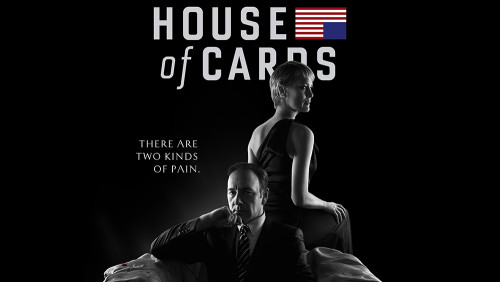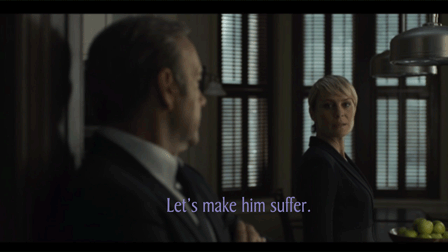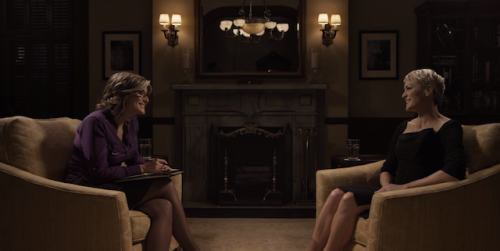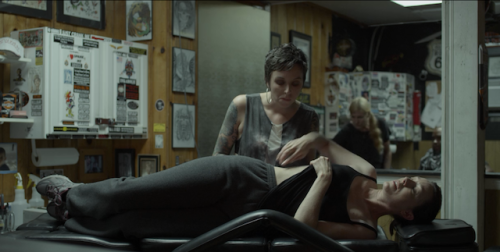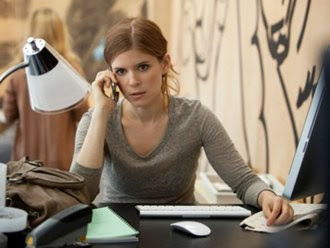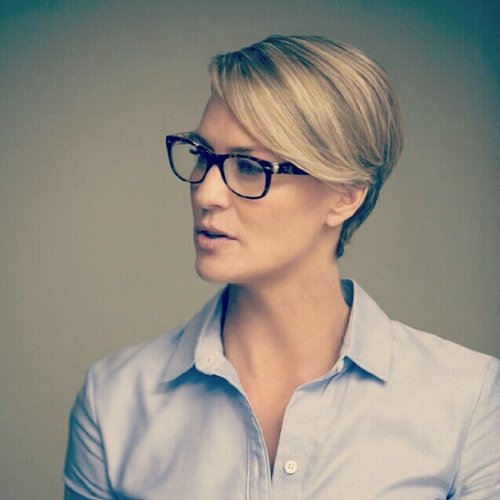
Written by Leigh Kolb.
Season 3 Spoilers Ahead!
See also: “Ruthless, Pragmatic Feminism in House of Cards“
Season 3 of House of Cards, released Feb. 27 on Netflix, ends abruptly, as we dangle on the edge.
As Claire gives her blood in Iowa–literally for the Red Cross for a nice photo op and figuratively for Frank’s career–she gets lightheaded, and tells their biographer that she thinks about jumping of a bridge. Before she passes out, she tells him that when Frank proposed, she’d told him that “every seven years, if it’s still good enough,” they’d stay married for another seven years before reassessing the marriage.
They’ve been married for 28 years. And it’s time to take stock of the partnership, which has been feeling less and less like a marriage of equals. There’s only one seat in the Oval Office, after all.
Season 3, at its core, is about a series of clashes. Not only are the Underwoods clashing, but so also are countries, special interests, and air and water temperatures. These clashes of powers and contrasts of ideologies can be violent, but season 3 is less shocking, less violent, less sexy, than seasons past. Frank and Claire Underwood were maneuvering and clawing their ways to the top, but now they’re there. Or at least, Frank’s there. Season 3 concerns the delicate and perhaps less passionate dance of staying at the top, when the only place you have to go is down.
Because of this, Frank and Claire seem decidedly less evil than they have in the first two seasons. All of the characters are complex and none is simply good or evil–the show has always been excellent that way, and that writing certainly lends itself to being decidedly feminist, as I’ve argued for the last two seasons. Frank even seems like a tragic hero sometimes, more disheveled, more pitiful than he was while he was violently rising the ranks. Of course, he opens the season by pissing on his father’s grave–so Frank is still Frank–but his desperation to hold onto power weakens him.
Claire accomplishes very little on her own in season 3. She needs Frank’s help to appoint her as UN ambassador when she can’t get the votes from Congress. Her role as First Lady repeatedly overshadows her own goals, and she eventually must resign her UN role because President Putin Petrov bullies Frank. She then must launch full-force into First Lady mode, dying her hair to please focus groups, kissing babies, shaking hands, living and working solely for Frank. This is not Claire Underwood. She knows that this is not who she is. By the end of the season, she’s acknowledged this, and is leaving the White House. “Claire!” Frank shouts as she announces that she’s leaving him, and the credits immediately roll.

As is suggested by the promo shots for season 3, Claire is becoming more and more an equal player in House of Cards (in season 1’s promos, she didn’t appear; in season 2’s, she sat behind Frank; in season 3’s, they are walking side by side, as they often do in the episodes). However, her role in the White House had to be for Frank, and it–and he–wasn’t enough. When Frank yells out for her to not leave at the end of the season, it’s because he also knows that he’s not enough. Without her, there will be no White House.
There are, as always, some incredible moments woven throughout this remarkably feminist political drama. Here are some of them:
Episode 1: They are sleeping in different bedrooms, and it’s clear that Claire is being left behind. She requests an appointment to be the UN ambassador, because the work of a First Lady is “not the same as contributing in a real way.” She says, “I’ve been in the passenger seat for decades. It’s time for me to get behind the wheel.”
Episode 2: Claire channels Hillary Clinton in during her nomination hearing, snapping that the “US military is irrelevant.” Of course, it’s taken completely out of context, just as Clinton’s “What difference does it make” statement was during the Benghazi hearings (the nods to current events in season 3 seem clearer than ever before). Claire is attempting to secure an incredibly important position in the UN, and at the same time, she has to pick two Easter Egg designs for the yearly Easter Egg Roll–a First Lady duty. The contrast between world power and decorative pleasantries is stark. “It’s too pink,” she says of one egg. “Girls like pink,” responds the woman with the eggs. Claire does not choose the pink egg.
Episode 3: Pussy Riot! Le Tigre! Russian President Petrov represents a time when “men were men.” He and Frank smoke Cubans and jockey for power while Ambassador Claire Underwood and Secretary of State Cathy Durant play beer pong and work toward peace. The masculine old guard often looks silly–the gifts, the games, the pride–but they too often still wield the power. By the end of the episode, Frank is lauding Pussy Riot and is flanked by Claire and Cathy (certainly not the last time he’s flanked by more powerful women in this season).
Episode 4: Solicitor General Heather Dunbar rises to power early on in the season. Frank asks her to consider his nomination for Supreme Court Justice, but she quickly realizes she wants to run for President instead. This episode deals with the US’s drone strike policies, and challenges the idea that killing innocent people to stop one guilty person is just. Meanwhile, a gay American activist is arrested and detained in Russia. In a bit of a heavy handed scene, Frank speaks with a priest in the church about justice and love, and ends up alone in the sanctuary, where he spits in Jesus’ face. The statue falls and breaks into a hundred pieces after he goes to wipe the spit off.
Episode 5: Dunbar starts campaigning, and takes the gay activist’s husband with her. She comes out strong on social issues that Frank has stayed moderate on. Frank’s dismantling of entitlement programs and his approach with America Works is Tea Party politics compared to the D next to his name. A powerful female reporter from The Telegraph replaces the former reporter whom Seth Grayson kicks out. He tries to silence one woman who asks challenging questions, and is faced instead with someone who is even more threatening. When Dunbar learns that Claire lied about her abortion on national TV, she says, “I would never do that to another woman,” in re: using the information against her. And in an incredibly powerful scene, Claire makes the Russian ambassador meet her in the woman’s bathroom while she puts on makeup, and then urinates with the door open. He’s uncomfortable, and she’s in control.
Episode 6: Claire goes with Frank to Russia to meet with Michael Corrigan, the imprisoned activist. They have a compelling conversation about marriage. Claire is unable to talk him into reading the prepared speech to be let free (he would have to apologize to President Petrov and Russia for parading nontraditional sexual ideas). Instead, he commits suicide while Claire sleeps in the cell, and he uses her scarf. She speaks out for him at the press conference–much to Frank and Petrov’s horror. “He had more courage than you’ll ever have,” she tells Frank. “I should have never made you ambassador,” Frank says. She responds, “I should never have made you president.”
Episode 7: Tibetan monks will work for weeks on intricate sand paintings, mandalas, and then ritualistically destroy it to symbolize the impermanence of the material world. A group of Tibetan monks are in the Underwoods’ White House as part of a cultural exchange. The gorgeous, time-consuming nature of their work, and the beautiful destruction of it, serves as a backdrop to Claire and Frank deciding to renew their vows. Claire changes her hair color to the dark shade it was when they first met. She’s being honored by GLAAD and other gay rights organizations. They must show the world that they are a team, but they are feeling less and less like one. Frank visits the FDR Memorial and reflects upon their similarities to the Roosevelts (his revamped “New Deal” and Claire’s human rights and United Nations activities). Claire rises again in this episode, and while they renew their vows and sleep in the same bed again, the monks poured all of that beautiful sand down a flowing river. Nothing lasts forever.
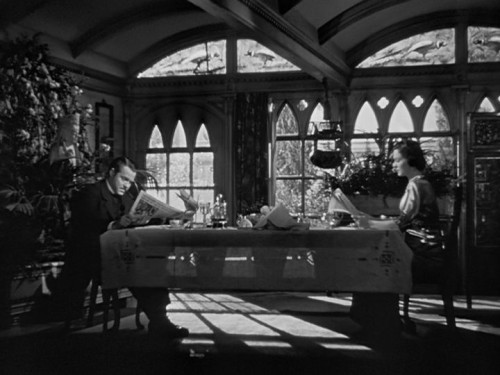
Episode 8: A hurricane is brewing, and it’s being narrated by two voices: novelist Tom Yates, whom Frank has asked to be his biographer; and Kate Baldwin, the enterprising Telegraph reporter. The feminine and masculine (not necessarily female and male) are frequently clashing in House of Cards. These forces–whether they be stereotypical ideals of compassion and power or embodied in figures like Tom and Kate themselves–are often at their best when combined. Freddy is back in this episode, and delivers a powerful message to his grandson after meeting with Frank: “He lied to you. You’ll never be president,” he says. “It’s good to have dreams, as long as they’re not fantasies.”
Episode 9: The women are always on top in season 3’s sex scenes. The sex scenes are less exciting than season 2’s, but this positioning doesn’t go unnoticed. On the campaign trail, Dunbar is taking a decidedly feminist approach: raising the minimum wage, fighting for gay rights, and ending corporate greed. Frank, on the other hand, chants “You are entitled to nothing,” and toes the individualistic, masculine line. Remy is faced with racism–from an Iowa lobbyist and the police. Doug–whose story line is terrifying and constantly uncomfortable, except for a few warm moments with his brother–is working for Dunbar to get info for Frank.
Episode 10: Claire sits between Israel and Palestine–she’s a powerful force. She’s tricked by Petrov, however (who has always clearly been threatened by her or anyone/anything that threatens the traditional order), and her fake intel leads to a US troop’s death. When Petrov and Frank meet in the Jordan Valley (the House of Cards version of the Gaza Strip), it’s a masculine scene–guns, ammo, tanks, kevlar, camo. Petrov tells Frank that Claire must not be an ambassador anymore. Frank agrees. This, then, is the beginning of what was already an end in sight. By the end of the episode, Claire is looking at a history of headshots, agreeing to go blonde because “Iowa in particular likes the blonde.” In what has become a necessity for each season, ambiguous sexual tension takes place between Tom and Frank. Tom admits that he used to “turn tricks” with men for a living, and got addicted to hearing their stories. They hold hands for a moment–it’s an incredibly intimate scene–and then it’s over. As others have noted, it’s refreshing to see sexuality treated with such nuance.
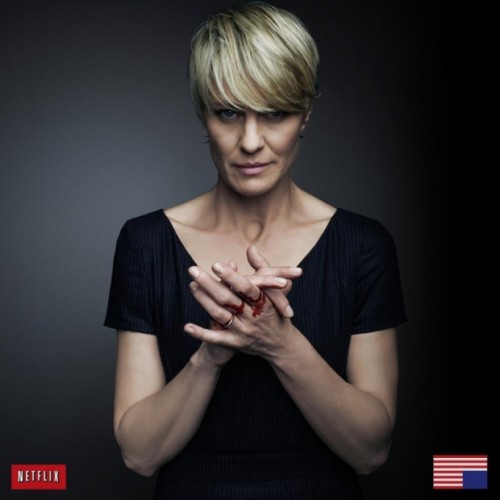
Episode 11: Blonde Claire gives a campaign speech at a fancy little ladies’ luncheon, quite the opposite of negotiating peace talks as she had been just days before. Claire is so much like Hurricane Faith, which was poised to make a huge difference, but then did nothing. Frank can’t control the weather, but he’s trying to control Claire. Jackie Sharp is also running in the Democratic primary, but only to split the vote to eventually be Frank’s VP. She doesn’t want to do what Frank tells her to–calling Dunbar sexist or bringing Dunbar’s children into the debate–but she does when Dunbar won’t promise her Secretary of Defense. So Jackie pulls the sexism card and pulls the private school card during the debate, and Frank attacks her for it. Shortly after, Jackie suspends her campaign and endorses Dunbar. Seth calls her a “Judas Bitch,” and Remy resigns as Frank’s Chief of Staff. Players are choosing sides, and Frank must rely on Claire’s likability to get the numbers he needs for Iowa. She’s reading children a book at story time now instead of attempting to broker peace between Israel and Palestine.
Episode 12: Claire is told to be more and more in the spotlight, even answering Q&As. She’s “favorable” to voters, and there are moments where it looks as if she’s the one running for president, and she certainly feels the sting of that not being the case. “I’ll keep waving my pom-poms,” she says. She spends time with a young mother in Iowa on the campaign trail. The Underwood signs in the yard are her husband’s, though. “I wish you were running for president,” she tells Claire. The exhausted young mother talks about her unhappy marriage, and laments to Claire that if it weren’t for the baby they took out two mortgages to have via IVF, that she would leave. Moments later, Frank calls Claire to tell her that Dunbar knows about her journal and the truth about her abortions. “No, Francis. This can’t happen. Whatever you have to do, fix it.” Doug brings the journal to Frank and burns the page, promising that he’d just gotten close to Dunbar to prove his loyalty to Frank. He requests, and gets, the position of Chief of Staff. Claire is rightfully furious, considering her reproductive choices have been used as political pawns by other people. Frank has stopped seeing Claire as an equal; as soon as he was in the Oval Office, she was just the First Lady.
Episode 13: Doug’s subplot of using Gavin to find Rachel climaxes in the last episode, as he buys a trash-heap of a white van to drive to her and avenge the fact that she’d beaten him almost to death in season 2 (after she had assumed–probably rightfully so–that he was going to kill her). These awful scenes are made more tragic by the fact that Rachel has escaped her former life and is helping other abuse victims in the process. Doug comes close to love and compassion when his brother stays with him while he gets clean, but he doesn’t come close enough. Claire tries to get Frank to “fuck her,” to “be rough,” but he won’t. He sends her back to DC, and we hear the screams and clapping for him campaigning while she gets back to the White House alone. Frank wins Iowa without her there, but he knows that she must be by his side for him to be successful. When he gets back, she’s sitting in his chair in the Oval Office–where she, and probably he, knows she should be. “For all these years,” she says, “I thought we were in this together. This is not what I thought it would be. It’s your office. You make the decisions.” He snaps back that she can’t have it both ways–to be an equal partner, and for men to control her (bringing up the sex scene in a powerful way). She feels “weak” and “small” and can’t feel like that any longer.
“Without me, you are nothing,” Frank snaps at her. “It’s time for you to do your job. You will be the First Lady.”
She looks at the picture of the Tibetan mandala–capturing a moment that was destroyed–and she packs her bags, but not for the campaign trail. Claire Underwood was meant to be first, not First Lady.
Leigh Kolb is a composition, literature, and journalism instructor at a community college in rural Missouri.
